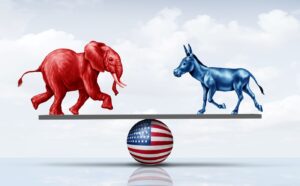American conservatives frequently complain that American liberals are intolerant—a striking paradox for a political movement whose very name suggests a respect for freedom. In their political rhetoric, liberals frequently resort to demonization, claiming, for example, that those who oppose same-sex marriage are animated by irrational hatreds. In the realm of public policy liberals openly desire to regulate communications media, like talk radio, that promote conservative ideas. Indeed, contemporary liberals routinely defend speech codes in the universities, which an older generation of liberals defended as bastions of untrammeled discourse. The complaint is so familiar, and the examples so numerous, that further elaboration of the phenomenon could serve no useful purpose.
What might serve some useful purpose, however, is an effort to reveal the roots of this intolerance. Tolerance is a delicate plant that does not grow easily in the soil of humanity. To some extent, then, liberal intolerance is simply a reflection of the ordinary weakness of human nature, which in all men yearns to silence those whose opinions differ too widely from their own. In theory, everyone admits that human reason is fallible. In practice, the conclusion we are apt to draw is that the other guy is wrong—so wrong that he should not even get a fair hearing.
Nevertheless, given the commitment of American liberals to abolishing intolerance and overcoming bias, it remains a vexing question why they should so often succumb to the very illiberal spirit they claim to reject. The answer is to be found in three aspects of contemporary liberal ideology.
In the first place, liberals are drawn into intolerance by their belief in progress, or rather Progress. The contemporary left is, to a considerable extent, committed to the notion that history, or rather History, moves according to a rational, discernible purpose, specifically in the direction of a gradual but irreversible amelioration of the human condition, understood especially as an ever-increasing equality. At first sight, one might expect that such a belief would actually foster tolerance. After all, why should one bother to silence non-progressive views if Progress is fated to advance no matter what anyone does? But it does not work out that way. Instead, the liberal belief in Progress causes liberals to view any expression of what they regard as retrograde opinion to be a threat to the very foundations of their worldview. When such opinions begin to gain popular support, they raise the specter that History might be stopped in its benevolent course or even reversed. In contrast, traditionalist conservatives can afford to be more tolerant of ideas they think mistaken, since they view them not as a threat to the gradual perfection of the human condition but as part of the usual parade of folly and weakness that always characterizes human affairs.
In the second place, contemporary liberalism is prone to intolerance because some of its most cherished political and cultural aspirations are at odds with the deeply-rooted moral convictions of the American society it is trying to reform. For example, liberals insist that homosexual relationships are morally equivalent to heterosexual ones, to the extent that the former should not only be tolerated but must be legally affirmed as the same thing as heterosexual marriage. Similarly, liberals hold that racially discriminatory policies are justifiable depending on which persons they advantage. At least in a country with America’s present culture, such ideas cannot win majority support in the context of reasoned public deliberation. Accordingly, liberals have to resort to hysterical denunciation of those who challenge such ideas, precisely in order to stop a debate they know they cannot win.
Start your day with Public Discourse
Sign up and get our daily essays sent straight to your inbox.Finally, the left is intolerant because it tends to be secular, and as a result is less able to respect the dignity of the individual human person. The Western tradition finds support for human dignity in the biblical belief that every human being is created in the image and likeness of a transcendent God. While history demonstrates that this belief has never been powerful enough to restrain all human evil, it nevertheless provides a powerful motive to respect the rights even of those with whom we disagree. From this point of view, no matter how wrong a man may be, he himself is of infinite value. Modern American liberals have to a considerable extent shaken off such theological convictions. In their place, many liberals have embraced Darwinism, understood not merely as a scientific explanation of the biological mechanisms of evolution but as a comprehensive account of man’s ultimate origins. Darwinism thus understood, however, purports to “know” that human beings emerged merely through the interplay of chance and necessity, and that they differ from other animals not in kind but only in degree. When fully appreciated, the biblical tradition encourages us to view every human being not only with respect but even with awe—a view for which contemporary Darwinism offers little support. As a result, while liberals are perfectly sincere in their desire to do good to humanity, they have no very strong appreciation for the worth of the human individual as an individual.
Thus we often find liberals seeking to advance the cause of social justice, as they understand it, by doing injustice to individuals. For example, recent reports about JournoList—the now defunct left-wing mailing list for reporters, commentators, and academics—revealed that one of its members proposed responding to concerns about Barack Obama’s relationship with Jeremiah Wright as follows: “take one of them [that is, someone on the “right”]—Fred Barnes, Karl Rove, who cares—and call them racists.” This suggestion apparently met with no principled objections from his liberal interlocutors. It seems not to have occurred to them—or at least not in such a way that it mattered much—that the suggested conservative victims of this accusation were living men with families, friends, and reputations, all of which would have been wounded by such a toxic charge.
None of this is to say that all liberals are intolerant. There are numerous honorable exceptions. It is to say, however, that those liberals who genuinely value tolerance may have to confront their own convictions—or at least those of the movement to which they belong—on a deeper level than is ordinarily supposed.










